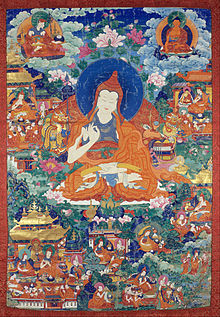Shantarakshita
| Śāntarakṣita | |
|---|---|

19th-century painting depicting biographical episodes from the life of Shantarakshita.
|
|
| Religion | Buddhism |
| Personal | |
| Born | Rewalsar, India |
Śāntarakṣita (Sanskrit; Wylie: zhi ba tsho, 725–788) was a renowned 8th century Indian Buddhist Brahmin and abbot of Nalanda. Śāntarakṣita founded the philosophical school known as Yogācāra-Svatantrika-Mādhyamika, which united the Madhyamaka tradition of Nagarjuna, the Yogacara tradition of Asanga and the logical and epistemological thought of Dharmakirti. He was also instrumental in the introduction of Buddhism and the Sarvastivadin monastic ordination lineage to Tibet which was conducted at Samye.
Shantarakshita's writings, lost for the most part in Sanskrit but preserved in Tibetan translation, give evidence of the encyclopaedic range of his learning, which embraced all the religious and philosophical currents of his time, Hindu and Buddhist alike.
There are few historical records of Śāntarakṣita, with most available material being from hagiographic sources. Some of his history is detailed in a 19th-century commentary by Jamgon Ju Mipham Gyatso drawn from sources like the Blue Annals, Buton Rinchen Drub and Taranatha. Śāntarakṣita was the son of the king of Zahor.
Born in Rewalsar, in the modern-state of Himachal Pradesh in India, Śāntarakṣita was brought to Tibet at the instigation of King Trisong Detsen sometime before 767 CE. One account details his first trip as unsuccessful and he spent six years in Nepal before returning to Tibet. Once established in Tibet, Śāntarakṣita oversaw the translation of a large body of scriptures into Tibetan. He oversaw the construction of the first Buddhist monastery at Samye in 787 CE and ordained the first monastics there. He stayed at Samye Monastery for the rest of his life, another 13 years after its completion, and this was considered significant by Tibetans later that he stayed and did not return to India. It is said that he was kicked to death by a horse. Also, in some accounts he left Tibet for a time due to the antipathy of Bonpos and interference from local spirits.
...
Wikipedia
